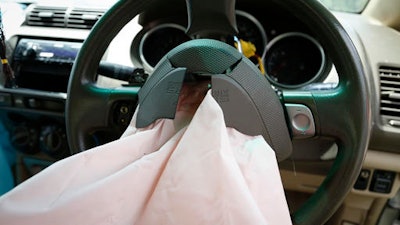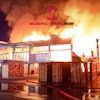
KUALA LUMPUR, Malaysia (AP) — Nida Fatin Mat Asis was slumped lifeless in her car seat, bleeding profusely from her nose and mouth, after her Honda hit a lamp post and skidded into a ditch. Her husband was slightly injured, and their baby wasn't hurt at all.
Her husband, like Nida a doctor, had no idea what had happened until the post-mortem came in: A broken metal canister, later identified as part of an air bag inflator, had shot through her mouth and lodged in the base of her skull.
The deaths of Nida and four other Malaysians have been linked to faulty Takata air bags that are at the center of one of the world's largest auto recalls. The U.S., with 11 deaths, is the only other country to have reported such fatalities.
Why this Southeast Asian country of 30 million would be hit disproportionately hard by the defective air bags is a mystery. The families of two Malaysian victims and a survivor blame weaknesses in their country's recall system. They also say Honda, the top foreign brand in Malaysia, hasn't done enough to warn car owners and hasn't provided enough replacement parts or alternative options for car owners if repairs cannot be done immediately.
The defective air bags have faulty inflators and propellant devices that may deploy improperly in an accident, shooting out metal fragments that can injure or kill.
All the deaths in Malaysia involved the Honda City, a subcompact made for Asia and Europe. Experts say heat and humidity can make air bag explosions more likely, but neighboring Thailand, with a similar tropical climate, has reported no deaths.
In his first media interview since his wife died on April 16, her husband Abdullah Shamshir Abdul Mokti told The Associated Press they were unaware of the recall and never got a notice from Honda for their used car.
Initially, he thought Nida, 29, had suffered a concussion. He was horrified to find no pulse.
"The inflator must have shot through her mouth like a bullet," he said.
The post-mortem report, shown to the AP, said a broken, 2.6 centimeter (1-inch) diameter, 2-centimeter (8/10ths of an inch) long air bag inflator lodged in the base of Nida's skull. Her teeth were smashed and her nose fractured. Injuries to her brain stem likely caused her immediate death, it said.
"As a Muslim, I accepted her death as fate but I also believe she is a victim of multinational corporate manslaughter," Shamshir said. "I hold Honda and Takata responsible. This isn't an isolated case. We have five deaths in Malaysia, five very preventable deaths."
More than 100 million vehicles involving 17 automakers have been recalled worldwide, including 69 million in the U.S. alone, underscoring the scale of the crisis.
The first accident in Malaysia in July 2014 killed a pregnant women and her unborn child. Three other people died after Nida's death, the last on Sept. 24.
Norazlin Haron died in a minor collision June 26 in a suburb of Kuala Lumpur.
A few weeks earlier, she had tried to get her car's air bag replaced after receiving a recall notice, but was told to return in July because parts were not available, said her eldest sister, Nor'ain Haron.
A fractured inflator, found in the car, may have punctured Norazlin's chest and lungs, said Nor'ain.
"It's like having a live bullet in the car," said Roslinya Latip, Norazlin's sister-in-law. "Honda is not doing enough. You sent a letter with an urgent stamp but there is no spare part and no Plan B. What's the point?"
Honda's first letters to car owners were labeled an "invitation for product update." Later letters, stamped "urgent," notified car owners of an "airbag inflator replacement activity," but did not explain the recall and risks involved.
There is also no explanation nor mention of deaths in the recall section of Honda Malaysia's website.
Honda America has a website on the recalls explaining the problem, including a video clip showing how the air bags can explode. It lists dates and locations of air bag-related deaths in the U.S.
There are no international standards for auto safety or recalls.
The Malaysian Association of Standards Users, a consumer group, blames the deaths on lax auto safety laws. It has called for a new vehicle safety authority similar to the National Highway Traffic Safety Administration in the U.S., and for a strict, clear warranty law to protect car owners.
Malaysia is Southeast Asia's third-biggest car market after Thailand and Indonesia, with more than 666,000 new cars sold last year. The transport ministry and the Road Transport Department didn't respond to AP queries about the air bag recalls and accidents.
Honda Malaysia told the AP in an email that 60 percent of the air bags have been replaced.
The families of Nida and Norazlin are in negotiations with Honda over a settlement, as is housewife Rabiah Ibrahim, whose near-miss led her to speak out.
A ruptured inflator slashed Rabiah's neck on May 3 after a minor accident in a small town in northwestern Perak state.
Rabiah, who bought the car used in 2010, says she didn't know about the recall.
"I am so thankful that I have been given a second chance in life, but Honda should be responsible," she said.






















